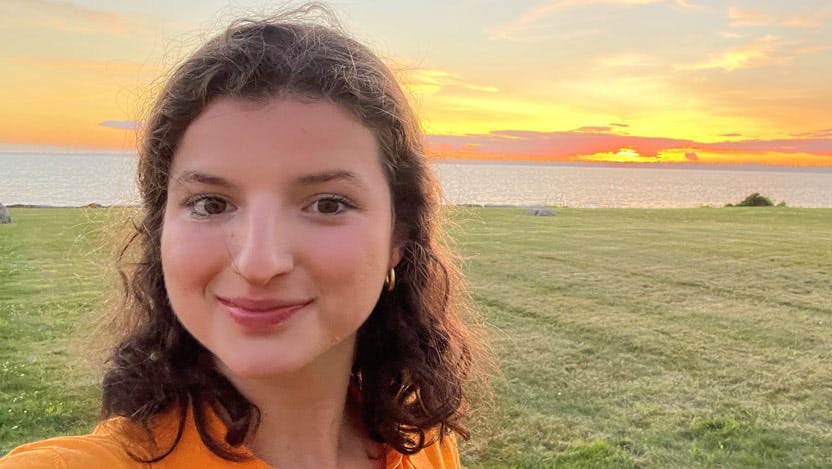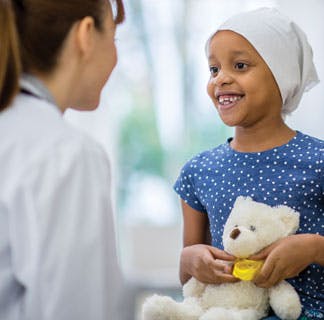College student celebrates being cancer-free for more than a decade after battling acute lymphoblastic leukemia as a tween

Maya Gray was just 8 years old when a routine blood test for her celiac disease uncovered a problem with her white blood cells. She was eventually diagnosed with acute lymphoblastic leukemia (ALL), a quickly progressing and potentially deadly cancer of the blood and bone marrow.
What followed was 27 difficult months of chemotherapy, spinal taps and a complication that had her using crutches for a short time. While the treatment plan recommended by her team at University of Chicago Medicine Comer Children’s Hospital wasn’t easy, it cured her cancer.
Today, 12 years later, the girl nicknamed “Miracle Maya” remains cancer-free.
Maya — a budding actress back then — went on to be the star of several high-profile ALL awareness and fundraising campaigns with organizations like the Leukemia & Lymphoma Society and the Make-A-Wish Foundation. While in middle school, she spoke at black-tie events, gave a speech in front of thousands of people at Soldier Field and co-emceed a Make-a-Wish Ball with actor John Stamos.
“Make-a-Wish reached out to me when I was in seventh grade to make a speech in front of a group. After that, it snowballed and turned into all these things,” she said. “I had opportunities to help and to give back to the community that helped me and gave me so much hope. They’re the reason why I’m here.”
Now a 20-year-old junior at Wesleyan University in Connecticut, Maya continues to advocate for ALL research and express gratitude for her Comer care team, especially oncologists Jennifer McNeer, MD, MSJames B. Nachman, MD, now-retired gastroenterologist Barbara Kirschner, MD and “Nurse Mary” Paterik, RN.

Maya’s cancer journey began in 2011 when Kirschner started treating her for celiac disease but knew something else was wrong based on the girl's physical symptoms and test results.
“I’ll never forget Dr. Kirschner saying, ‘If this was my grandkid, I’d admit her and put a full team together to do tests. Otherwise, you’re going to spend the next few months going from doctor to doctor, not knowing what’s going on, and it will drive you crazy.’ So that’s what she did,” said Michael Gray, Maya’s father. “It was the best advice we could have ever gotten. I remember exactly where I was standing in Comer when she told me that and I feel forever indebted to her for that.”
My advice to patients going through this now is to keep marching. You’re going to get through it. You’re stronger than you think you are.
Maya stayed in Comer for one night — the only night she’d ever spend in the hospital during her treatment — and pediatric doctors from several different specialties, including oncology, hematology and infectious diseases, ran tests. They quickly discovered what was wrong: Maya had small amounts of what appeared to be leukemic cells in her bone marrow. It wasn’t enough to diagnose her with leukemia just yet, but they monitored the situation with regular blood tests.
It was a very scary time, recalled Maya’s mom, Nada Gray.
“How often have you seen a doctor and they say, ‘Well, I suggest you see another doctor’ and send you off? At Comer, they had the humanity to say, ‘Let’s help you and figure out what this is,’ and then did it right away,” Nada said. “I never felt like Comer was an institution. I felt like it was a place with people who wanted to help. And we had a strong sense of the academic brilliance of these doctors, too.”
Within months, the leukemic cells increased and Maya was diagnosed with ALL. It was discovered at the earliest stage, a big advantage that allowed treatment to begin immediately.
As she started treatment, Comer's Child Life Specialists visited Maya’s school and spoke to her second-grade class at Latin School of Chicago. Using stuffed toys resembling red blood cells, white blood cells and platelets, they explained to the students what cancer was, that they couldn’t catch it from Maya, that it wasn’t her fault she got sick, and that Maya’s hair was going to fall out soon from chemotherapy and she’d be bald. Thanks to their educational efforts, the first time Maya walked into the classroom without hair, the students were unfazed. In fact, they rallied around her.
“It made it so much better, because the kids understood,” Nada said. “That’s an amazing service Comer has for families, and it’s something I didn’t know we needed.”
On Maya’s last day of chemotherapy, her classmates wrote congratulatory messages to her on paper tulips. She still has them. Her 5-year cancer-free anniversary was announced on the speaker during the lunch period in 2016.
Maya’s parents had support from her Comer doctors, who recognized the difficulty of navigating both celiac disease and cancer at the same time. They took time to explain everything to Maya’s parents and responded quickly to questions, keeping a positive, we-can-fight-this attitude.
Michael recalls Nachman giving them a stern talk about the importance of keeping their family and personal lives on track during this time, rather than giving every ounce of themselves to Maya.
“They made me feel not anxious, and I’m an anxious person. Just ask my wife,” Michael joked. “They not only saved Maya’s life, but also our quality of life.”
Unlike many other hospitals, Comer tries to pair nurses and patients. The familiarity creates a calming effect, as it did with Maya and Nurse Mary, who developed a tight bond during her years of treatment. Maya was petrified of needles and screamed loudly during injections. So, Nurse Mary once arrived wearing earplugs, joking that she was ready to give Maya her shot. Once they had a contest for who could scream the loudest.
“I think it scared some of the other staff,” Paterik said.
Leukemia is the most common cancer diagnosed in people under age 20. The survival rate for ALL is high, and the quality of life for survivors is good. But chemotherapy can cause long-term complications affecting the central nervous system, neurocognitive function, mobility and vision, McNeer said.
“Even when treatment goes according to plan, that doesn’t mean it’s easy. Fortunately, Maya has done beautifully,” McNeer said. “Her prognosis is excellent. We expect her to have a very long and successful life. I know there are really great things ahead for her.”
Maya continues to encourage children battling ALL, saying it’s OK to acknowledge that it’s an awful disease, hard to deal with and unfair.
“Most people are going to treat you like a fragile piece of china, and sometimes you are. But it’s important to find light wherever you can,” she said, recalling how her mom cheered her up by taking her to her favorite bookstore or bakery after particularly tough treatments.
Maya’s also glad to see hospitals, including Comer, now emphasizing a patient’s mental health during treatment, caring for their mind as well as their body.
“My advice to patients going through this now is to keep marching. You’re going to get through it. You’re stronger than you think you are,” she said.
Though Maya no longer needs care at Comer, the Gray family maintains a relationship with McNeer.
“When Maya left for college last fall, I sent (McNeer) an email just to say how grateful I was,” Michael said, choking back tears. “As Maya drove off, that’s who I thought of. The Comer doctors.”

Pediatric Cancer Care
All of our efforts are dedicated to helping kids and teens with cancer beat the disease, so they can live active, full lives.
Learn about our kid-focused cancer care